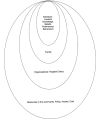Exploring the barriers and facilitators of dietary self-care for type 2 diabetes: a qualitative study in Ghana
- PMID: 31508343
- PMCID: PMC6717922
- DOI: 10.15171/hpp.2019.31
Exploring the barriers and facilitators of dietary self-care for type 2 diabetes: a qualitative study in Ghana
Abstract
Background: There is an increasing prevalence of type 2 diabetes (T2D) globally and countries in Sub Sahara Africa, such as Ghana are contending with the epidemic. The main objective ofthis study was to explore the barriers and facilitators of T2D self-care as perceived by patients and health providers (HPs) in Ghana. Methods: A maximum variation sample of 33 adult patients with a range of demographic features, diabetic conditions and self-care regimens and 3 providers were purposely selected from the specialist diabetes clinic of a private hospital in Accra, Ghana. Data were collected using in-depth interviews, which were recorded and transcribed; and non-participant observational field notes-that were analyzed thematically through directed content analysis. Results: The findings reveal that T2D adult patients face many inter-related challenges to diabetes self-care, than enabling factors that fell into four major domains:1) the counselling process and context (patients missing follow-up appointments, unacceptance of diagnosis); 2)recommended food and diet regimens (changing habitual diets, dislike and confusion about recommended diets); 3) social aspects (social functions interfering with dietary regimens, family members diverting patient from dietary goals) and 4) fears (non-disclosure to family member/pretense of being well). Conclusion: Integrated self-management interventions are needed to address these barriers, including tailoring dietary education to patients' specific needs, guiding patients on how tomanage diet during social occasions and among family members; and as well, providing mental health support. Future research should focus on T2D self-care behaviours and practices outside the clinic, including home, work and shopping environments.
Keywords: Diet; Ghana; Health education; Health promotion; Self-care; Social support; Type 2 diabetes mellitus.
Similar articles
-
Barriers to diabetic self-care: A qualitative study of patients' and healthcare providers' perspectives.J Clin Nurs. 2019 Jun;28(11-12):2296-2308. doi: 10.1111/jocn.14835. Epub 2019 Mar 6. J Clin Nurs. 2019. PMID: 30791160
-
Attitudes towards, facilitators and barriers to the provision of diabetes self-care support: A qualitative study among healthcare providers in Ghana.Diabetes Metab Syndr. 2019 May-Jun;13(3):1745-1751. doi: 10.1016/j.dsx.2019.03.041. Epub 2019 Mar 29. Diabetes Metab Syndr. 2019. PMID: 31235088
-
Facilitators, barriers and expectations in the self-management of type 2 diabetes--a qualitative study from Portugal.Eur J Gen Pract. 2015 Jun;21(2):103-10. doi: 10.3109/13814788.2014.1000855. Epub 2015 Feb 20. Eur J Gen Pract. 2015. PMID: 25698085
-
Diet and physical activity in the self-management of type 2 diabetes: barriers and facilitators identified by patients and health professionals.Prim Health Care Res Dev. 2013 Jul;14(3):293-306. doi: 10.1017/S1463423612000412. Prim Health Care Res Dev. 2013. PMID: 23739524
-
Diabetes self-management: a qualitative study of education needs, practices and caregiver support in the Keta Municipality of Ghana.BMJ Public Health. 2024 Aug 14;2(2):e000640. doi: 10.1136/bmjph-2023-000640. eCollection 2024 Dec. BMJ Public Health. 2024. PMID: 40018578 Free PMC article.
Cited by
-
Self-care behaviors and associated factors among individuals with type 2 diabetes in Ghana: a systematic review.BMC Endocr Disord. 2023 Nov 22;23(1):256. doi: 10.1186/s12902-023-01508-x. BMC Endocr Disord. 2023. PMID: 37993843 Free PMC article.
-
Adherence to diabetic self-care management and associated factors among type 2 diabetic patients in North Shewa Zone public hospitals in Amhara Region, Ethiopia.Front Clin Diabetes Healthc. 2025 May 9;6:1560907. doi: 10.3389/fcdhc.2025.1560907. eCollection 2025. Front Clin Diabetes Healthc. 2025. PMID: 40416402 Free PMC article.
-
Diabetes self-management education interventions and self-management in low-resource settings; a mixed methods study.PLoS One. 2023 Jul 14;18(7):e0286974. doi: 10.1371/journal.pone.0286974. eCollection 2023. PLoS One. 2023. PMID: 37450431 Free PMC article.
-
Opportunities for Interventions That Address Socioeconomic Barriers to Type 2 Diabetes Management: Patient Perspectives.Sci Diabetes Self Manag Care. 2021 Apr;47(2):153-163. doi: 10.1177/0145721721996291. Epub 2021 Feb 28. Sci Diabetes Self Manag Care. 2021. PMID: 34078177 Free PMC article.
-
Dietary adherence among persons with type 2 diabetes: A concurrent mixed methods study.PLoS One. 2024 May 7;19(5):e0302914. doi: 10.1371/journal.pone.0302914. eCollection 2024. PLoS One. 2024. PMID: 38713660 Free PMC article.
References
-
- International Diabetes Federation (IDF). Diabetes Atlas 8th Edition 2017. Available from: https://www.idf.org/component/attachments/?task=download&id=1525:Atlas-8.... Accessed June 19, 2019.
-
- Dagogo-Jack S, editor. Diabetes mellitus in developing countries and underserved communities. Switzerland: Springer International Publishing; 2017.
-
- Ministry of Health (MOH). National Policy for the Prevention and Control of Chronic Non-Communicable Diseases in Ghana August 2012. Ghana: MOH; 2012.
LinkOut - more resources
Full Text Sources

